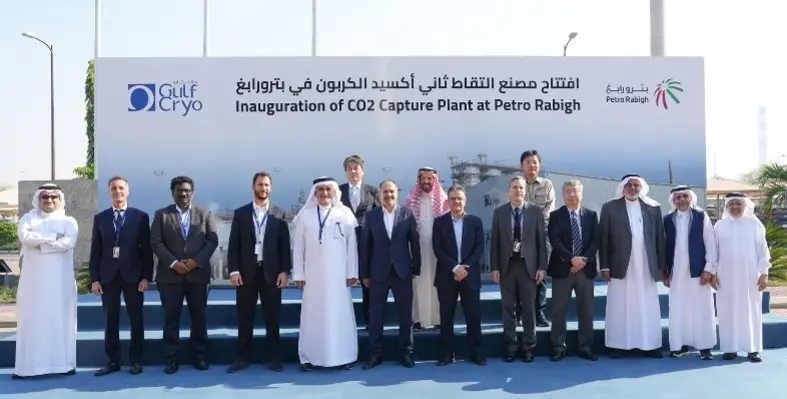Petro Rabigh and Gulf Cryo announced the inauguration of a new carbon capture and utilisation facility, located in the kingdom's western region
Gulf Cryo designed, constructed, and operated an advanced carbon capture plant at Petro Rabigh's Mono Ethylene Glycol (MEG) plant, which is located at the Red Sea town of Rabigh, north of Jeddah. The project is considered the first carbon capture plant in Saudi Arabia's western region dedicated to the merchant market and the second in the kingdom.
The new facility captures 300 metric tons of CO2 per day directly from the MEG plant. This will result in the reduction of 100,000 metric tons per annum of carbon emissions at the source from the MEG plant, representing an 85% reduction in its total annual CO2 emissions footprint. The captured CO2 is equivalent to the sequestration capacity of approximately 360,000 Mangroves trees planted annually over their lifetimes.
The captured CO2 will be purified to a high-purity food-grade level by Gulf Cryo and transported in liquid form for re-use. Petro Rabigh will utilise part of the CO2 stream internally. At the same time, Gulf Cryo will supply the remainder to other industries across the Kingdom, including water desalination and mineralisation, food preservation and transport cooling, agriculture, beverage carbonation, and ready-mix concrete.
Othman Al-Ghamdi, president and CEO of Petro Rabigh Co., said, "Taking meaningful action to cut our carbon footprint is a strategic priority for Petro Rabigh. Through this pioneering initiative under our strategic partnership, we are demonstrating an unwavering commitment to significantly reducing emissions over the long term. This directly supports the Kingdom's ambition to achieve net zero emissions by 2060," he concluded.
Abdul Salam Al Mazro, vice chairman of Gulf Cryo, said, "This landmark project anchors our leading position in CCUS solutions in the region and marks our first carbon capture project in the kingdom. It underscores the importance of managing the full CO2 value chain; we reduce emissions at source while utilizing the recovered CO2 as a vital resource to help decarbonise supply chains of various industries."
"Working alongside Petro Rabigh is a real pleasure and demonstrates a successful partnership and a joint commitment to environmental stewardship. We look forward to celebrating continuous successes together," he concluded.







